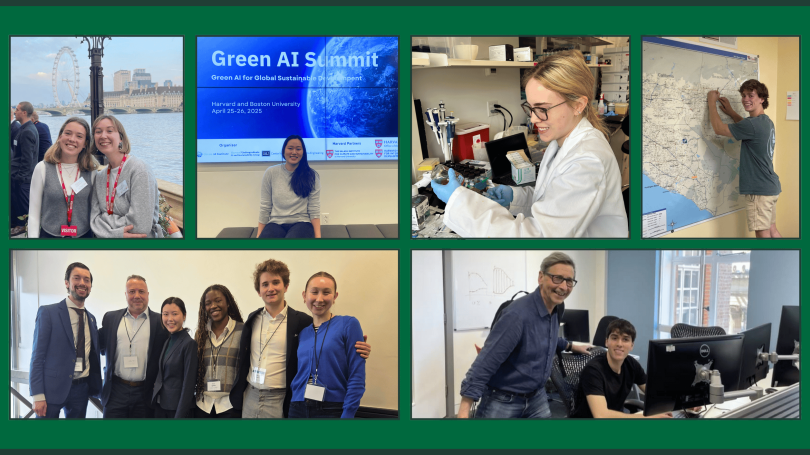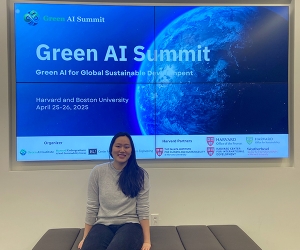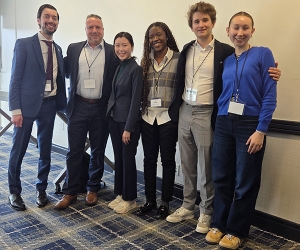

In spring 2025, while researching sustainable data centers with the US-Asia Sustainable Development Foundation and co-authoring a white paper, Economics & Mathematics double-major Elaine Jiao '27 attended a conference exploring the intersection of data center design, renewable energy, and environmental regulation. As she learned about cross-national strategies—from thermal management and green financing models to regulatory frameworks—one moment stood out:

"The coolest part of the experience was seeing the research that I, and the team, conducted brought up and discussed in front of these professionals and policy-makers," Jiao recalled. "I also gained confidence engaging with professionals and realized how eager many are to mentor students and share their knowledge."
Jiao's work was funded by an Irving Institute Student Grant, which provides funding each term to enrolled undergraduate and graduate students pursuing projects and experiences aligned with the Institute's mission of accelerating an affordable, reliable, and equitable clean energy transition for the benefit of society.
"My experience researching and collaborating with other analysts not only expanded my understanding of environmental sustainability in the tech sector, but also deepened my appreciation for how interdisciplinary approaches—combining policy, engineering, and economics—are essential to addressing today's environmental challenges," she reflected. "It reminded me that sustainability isn't just about technology or policy in isolation, but the synergy between them—and that students, not just industry professionals, have a role to play in shaping that future."
During the 2024-2025 academic year, 37 individuals and one group received student grant funding from the Irving Institute. More than $140,000 was distributed to support internships, research, and professional development. Among the student projects, 31% of recipients completed internships, 48% conducted research, and 21% attended professional development opportunities.
Through their experiences, students applied classroom learning in real-world contexts, connected with academic experts and industry leaders, and gained insights into career paths and graduate study options. Along the way came breakthrough moments—discovering firsthand the dynamic interplay between energy systems and communities, and the critical roles that Dartmouth students can play at local and global levels.

Mechanical Engineering major Witt Lindau '27 interned with Solaflect Energy, a Vermont-based renewable energy startup focused on expanding access to solar-powered EV charging.
He noted it was an "incredible hands-on opportunity to explore the intersection of clean energy, business strategy, and data-driven marketing."
Lindau redesigned the company's business-to-business email engagement reporting system, developed automated marketing campaigns, and helped streamline data integration across platforms. He also led onboarding for new tools, created training materials, supported rebranding efforts, and contributed to targeted outreach ahead of key industry events.
"I learned technical skills, strategic thinking, and how to take initiative within a startup setting," Lindau reported. "If you're passionate about renewable energy and like solving operational puzzles, opportunities like this can be deeply rewarding and informative for your career direction."

Thayer School of Engineering graduate student Ene Michelle Igomu attended the MIT Energy Conference, where she connected with experts in renewable energy as well as fellow researchers and graduate students across engineering, policy, and climate disciplines.
"The conference provided me firsthand insights into the latest advancements in clean energy, from hydrogen electrolyzers to fusion energy," she recounted. "Through hearing from startups and investors, I gained a real-world perspective on translating research into deployable technologies."
Over two days, Igomu attended panels on topics including AI and electricity demand, the supply chain and ethical sourcing of minerals needed for clean energy technologies, and scaling new technologies from the lab to implementation. She also explored how public-private partnerships can drive large-scale decarbonization efforts, sustainable investment models for funding fusion energy, and the global carbon market.
"Engaging with professionals across engineering, finance, and policy broadened my understanding of the interdisciplinary nature of energy innovation," Igomu observed, noting that it was "an excellent opportunity to stay ahead of industry trends, engage with experts, and establish connections that could shape future research and career paths."

Engineering Sciences major Brianna Lambert '27 interned with Terragia, a biotech startup dedicated to the development and deployment of low-cost, low-carbon biofuels. Professor of Engineering Lee Lynd, an Institute Faculty Advisory Board member, is the CTO and Co-Founder of the startup.
"Terragia has a strain development team that works to create new bacteria, a microbiology team that tests the various strains, and a fermentation team that tests the successful bacteria under different conditions," Lambert explained.
Working with the fermentation team, Lambert conducted market research on potential feedstocks—the raw materials used to produce biofuel. She performed lab and data analyses to compare the sugar content and fermentation potential of various feedstocks. Her work supported both scientific research and process optimization, culminating in bottle fermentation trials and a final report.
"I presented my research and data analysis findings in a company-wide meeting," she shared.
Lambert also advocated for and executed her own experiment.
"I proposed an experiment to run a bioreactor with an ethanol-water mixture and measure its ethanol levels via HPLC [High-Performance Liquid Chromatography] and was granted permission to perform the experiment," she enthused.
Reflecting on her experience, Lambert offered advice for future interns:
"If you have the chance to sit in on meetings, after you understand what expectations for them are, don't be afraid to contribute," she recommended. "The team was open to my ideas and ready to hear about any uncertainties I had before performing something."

Mechanical Engineering major Doruk Ozel '26 worked with Professor Aidan O'Sullivan at the University College London Energy Institute, developing a system to access and analyze timely wind generation and forecast data.
Ozel built scripts to aggregate wind generation by site and calculate forecasting error metrics. His work included validating forecasting accuracy, reviewing literature on improving offshore wind predictability, and exploring advanced time-series models.
"I also became a more effective communicator through working with Professor O'Sullivan," Ozel noted. "I constantly had to present my progress, justify key methods that I was deciding between, and incorporate feedback rapidly."
Ozel also attended the AI Solutions for Climate Change Summit in London, which expanded his thinking.
"It was greatly insightful because it showed me just how fast AI is developing to ensure a clean future and how we are still very far from achieving a fully clean future for our environment," he remarked.
"I believe that engaging in this research project has enlightened me to focus my career in a direction where I can help the environment with technology," Ozel continued. "The next few decades will surely be critical for the future of clean energy."

Environmental Studies major Benna McDermott '26 interned with the policy team at Energy Saving Trust (EST) in London, where she completed research and writing assignments and attended high-level events and meetings.
"I learned about the current policy climate around net zero in the UK, including the new Labour government's plans for Great British Energy, the Warm Homes Plan, and heat decarbonisation," explained McDermott. "I had the privilege to attend multiple events in Parliament, including two meetings with members of Parliament, where we discussed the timeline for these policies and the recommendations and expertise that EST can provide."
Like her fellow students, McDermott was enthusiastic about connecting the dots from the Dartmouth classroom to professional roles.
"I saw how concepts from my geography and environmental studies classes, such as energy justice and energy security apply in a real-world setting," she observed. "The specific policies and programs I have learned about have shaped my understanding about what is possible, and I will bring these learnings back to a U.S. context."
She also gained experience in marketing and communication practices.
"I assisted the marketing and communications team with social media posts to promote events and report launches," she described, "which was helpful practice in distilling the complex language of reports into digestible sentences for a general audience."
McDermott noted that the experience will be instrumental in shaping her next steps.
"My internship experience has greatly increased my awareness of careers in the sustainability and energy sector," she remarked. "It will be incredibly beneficial moving forward at Dartmouth and beyond."

Engineering Sciences and Geography double-major Helen Deng '26 is interested in the intersection of technology and policy in renewable energy projects. She conducted an independent case study on the Empire Wind 2 Offshore Wind Project in Long Beach, New York, under the supervision of Professor Elizabeth Wilson.
To uncover the factors behind the termination of the project's transmission infrastructure agreement — and the broader lessons for U.S. offshore wind development — Deng completed document analysis, stakeholder interviews, and policy analysis.
Her case study served as a reading in Professor Wilson's senior capstone course on offshore wind, and parts of her research are being included in a forthcoming book chapter and journal manuscript.
"Through this research, I deepened my understanding of energy systems, infrastructure planning, and barriers to renewable energy deployment," Deng remarked. "The experience reinforced my interest in energy policy and regulation, particularly in how decision-making processes shape the success or failure of large-scale infrastructure projects."
The experience also helped shape her academic and professional goals.
"I am now considering graduate school as a pathway to further explore energy systems, as well as career opportunities that involve bridging the gap between technical energy solutions and the policy frameworks that enable their implementation," she shared. "Whether through further academic research or professional experience in the renewable energy sector, I hope to contribute to building more resilient and socially equitable energy systems."
Students who are pursuing energy transition-related research, unpaid internships, or presenting work at energy- or climate-related conferences are encouraged to apply for Irving Institute Student Grants. The Institute offers grants of up to $6,000 to enrolled undergraduate and graduate students pursuing projects that transform our understanding of energy, climate, and society issues, and drive the creation of ideas, technologies, and policies that benefit all people.
2025-2026 Student Grant Deadlines